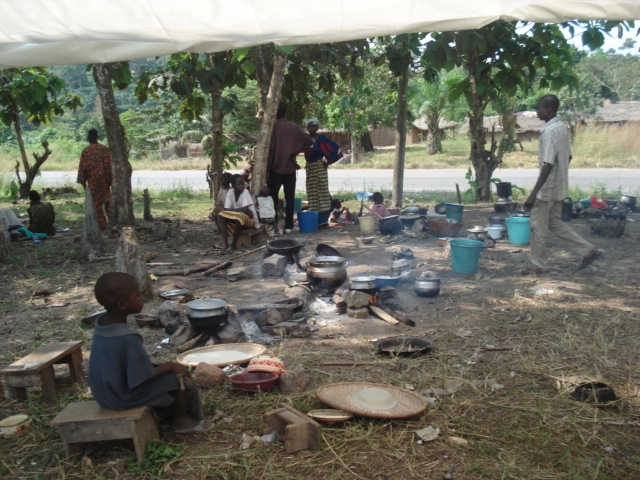UN and local officials say the clashes - in the sub-prefecture of Zeaglo, some 450km northwest of the commercial capital Abidjan - underscore the importance of reconciliation efforts in the volatile west, a zone long wracked by land disputes and hit by some of the worst violence during the country's six-year conflict.
“This is an isolated case but it is clear that social cohesion efforts are extremely important," the UN humanitarian coordinator and deputy special representative for the Secretary-General, Georg Charpentier, told IRIN. “In most places returns have worked very well. But there are some pockets of resistance and this will need some more intensive [reconciliation] efforts.”
On 20 November rifle-wielding youths attacked a convoy - organised by local authorities and escorted by security forces - bringing 81 returnees to farms near Zeaglo, according to the UN Office for the Coordination of Humanitarian Affairs (OCHA) in Côte d’Ivoire. Hundreds of farmers have already resettled in the region but the plantation to which farmers were to have returned on 20 November is being claimed by a local cooperative.
The ambush and ensuing unrest, in which at least two people died, forced hundreds of people to flee their homes and take refuge in a local government building for several days. UN aid agencies provided food and other assistance to the displaced.
|
Photo: OCHA  |
| Local youths set fire to homes and other property, including this mill |
Manipulation
UN and local officials said it appears some unemployed local youths were manipulated by people with economic interests in the plantation. They said most residents were on board for the return of farmers - immigrants or descendants of immigrants from neighbouring countries as well as Ivorians, all displaced by conflict.
“Youths in Zeaglo are caught between local authorities advocating reconciliation and cooperation among communities, and a group of individuals who are trying to sow division for their own interests,” said Gnonsékan Martin, prefect of Blolequin, the prefecture in which Zeaglo is located.
He said since conflict drove farmers off the land, locals have been cultivating much of it, but the situation has now changed. “The war is over, the situation is normalised. It is time for the illegal occupants of this land to [adjust accordingly].”
Gnonsékan spoke with IRIN on 27 November having just led a delegation of returnees and local youths to the plantation to assess and discuss the situation.
The cooperative claims rights to the disputed plot of land - about 1,000 hectares, according to a report by UN aid workers monitoring the situation. But UN officials say all parties concerned had agreed months ago on the farmers’ return.
Land rights
As Côte d’Ivoire struggles to restore stability, one major challenge is the return of the thousands of farmers who fled cocoa plantations in the west. In the past few years families have been gradually returning to the land they farmed before the 2002 rebellion. Even before the conflict, land tenure issues were a source of tension in Côte d’Ivoire, which West African migrant workers helped make the world’s top cocoa producer.
Recognising local tensions surrounding the return of farmers to Zeaglo, the authorities and the UN have held numerous meetings to stave off problems. In July 2008 local residents and returnees agreed on a formula for sharing the land, said the UN’s Charpentier, who attended the meeting.
In the Zeaglo incident at least one local resident died in an exchange of gunfire when armed youths blocked the convoy, and a Burkinabé resident was later killed in an apparent reprisal, according to a UN official. Local youths burnt down several homes of farmers who had earlier settled back in the area.
The sub-prefect of Zeaglo, Okou Paulin, said: “We were surprised, given how much we had worked on preparing for these returns.”
UN and local officials said despite the setback they were confident that all the families would soon be able to return to the plantation. Prefect Gnonsékan said an investigation was under way into the Zeaglo incidents.
“Things are still quite fluid”
Most of the 300 or so people who had sought refuge at the Zeaglo sub-prefecture building had returned to their homes as of 27 November, according to Alphonse Munyaneza, head of the UN Refugee Agency (UNHCR) office in the nearby city of Guiglo.
Talking to IRIN from Zeaglo, he said the 80 or so people remaining were those whose homes had been burnt down.
“The situation in Zeaglo is something of a test case, because there are those who want to throw the [July] agreement into question,” Munyaneza said. “Their efforts are not working, but they are creating turmoil and a sense of instability. Things are still quite fluid. We must push an agenda of reconciliation.”
UN agencies and local authorities are working to convince people that it is in everyone’s socio-economic interest to cooperate, he said, pointing out other areas in which communities have been able to deal with population returns and move forward. “We tell them that they have an incentive to work together because aid groups and the government will be behind them on that. It is the socio-economic reality of this region... These communities need each other.”
np/cb
This article was produced by IRIN News while it was part of the United Nations Office for the Coordination of Humanitarian Affairs. Please send queries on copyright or liability to the UN. For more information: https://shop.un.org/rights-permissions




